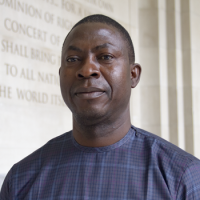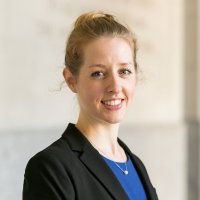Herder-Farmer Conflicts and Food Security in Southeast Nigeria: Plugging the Gaps in the Peacebuilding Policy Framework
Ms. Cheri Ayers, Program Assistant (Communications), welcomed participants and introduced the event, the SVNP project, and the scholarship program. Ms. Hannah Akuiyibo, Senior Program Associate, framed the discussion, introduced the speakers, and moderated the event. The event featured Dr. Hyginus Banko Okibe, a Southern Voices Network for Peacebuilding Scholar at the Wilson Center and Lecturer at the Department of Political Science at Enugu State University in Nigeria and Dr. Mark Duerksen, Research Associate at the Africa Center for Strategic Studies.
This event assessed the challenges the conflict poses to food security and the response efforts by federal and state governments. It discussed the environmental, governance, and developmental drivers of the conflict to provide a fuller picture of the security challenge. Finally, it discussed gaps and opportunity areas for restoring and advancing peace and security in the region and offer practical policy options and recommendations to that end.
Dr. Duerksen framed the discussion by placing the increasingly complex Herder-Farmer conflict in the context of other national and regional dynamics. Herder-farmer conflicts are not isolated to Nigeria, but present throughout West Africa and the Sahel. More recently, these clashes have migrated southward in Nigeria which has seen an uptick in violence. Dr. Duerksen addressed population growth as a key driver of conflict as population pressures have created growing demand for food and cattle. Meanwhile, resource competition and changing patterns in land use driven by climate change have contributed to challenges to access to land and water. He noted that criminal activities, including gangs and militant separatists, are complicating factors that particularly affect pastoralists with exposed herds vulnerable to cattle rustling or ransom demands. Open grazing bans, supported by state governors in the south, have heightened tensions, and Biafran separatists have utilized grievances against herders to mobilize for their independence efforts. While often framed as an ethno-religious conflict, misinformation and disinformation for political purposes has exacerbated communal tensions. Dr. Duerksen presented policy options and recommendations, including: prioritizing de-escalation through monitoring and taking action against inflammatory language as well as training community leaders in local peacebuilding; maintaining a sustained security response of trusted police in order to deter violence; and investing in improving land management policies and strategic efforts toward implementing and resourcing policies for land usage. He noted that while acute food insecurity is not yet present in southeast Nigeria, early action is needed to prevent this escalation.
Dr. Okibe addressed key historical factors, including the traditionally peaceful and manageable relations between herders and farmers that were managed through dialogue and negotiation as well as compensation mechanisms for peacebuilding. He noted that the legacy of the Biafran Civil War has complicated trust between the Southeast and other parts of the country. More recently, desert encroachment and subsequent loss of grazing areas in the North has driven herders further south, which has damaged crops. He also underscored that weak border governance and border porosity contributes to that migration onto agricultural lands from people without whom there are traditional community ties. Agricultural production in the region has dropped which weakens food systems. Dr. Okibe noted that responses from government security agencies have been ineffective in maintaining peace, and that tensions between the state and federal government over open grazing have stymied resolution efforts. He proposed several options for making progress toward peacebuilding and enhancing food security, including: stronger action on grazing permissions in Nigeria; enhancing federal-state collaboration toward conflict resolution; addressing the trafficking of arms across borders, which heightens insecurity; investing in technology and efforts to improve land in the North through irrigation to make more land available for grazing; and following up efforts to create and support ranching in Nigeria.
Southern Voices Network for Peacebuilding: Centering African knowledge and agency is key to building and sustaining peace in Africa. The Southern Voices Network for Peacebuilding (SVNP) is a network of 22 African policy, research, and academic organizations that works with the Wilson Center’s Africa Program to attain the most appropriate, cohesive, and inclusive policy frameworks and approaches for achieving sustainable peace in Africa. Generously funded by Carnegie Corporation of New York since its establishment in 2011, the SVNP works to generate African knowledge to inform U.S. and international peacebuilding policies on Africa; help build the next generation of African peacebuilders through its scholarship program; and create a pan-African network of African peacebuilding organizations, practitioners, and experts to collaborate and share knowledge, best practices, and lessons learned on peacebuilding in Africa.
This event was livetweeted and webcast. Follow the Africa Program Twitter account @AfricaUpClose and catch up on the conversation using the hashtags #FoodSecurity and #SVNP.
Speakers

Lecturer, Enugu State University of Science and Technology, Department of Political Science
Introduction

Moderator

Hosted By

Africa Program
The Africa Program works to address the most critical issues facing Africa and US-Africa relations, build mutually beneficial US-Africa relations, and enhance knowledge and understanding about Africa in the United States. The Program achieves its mission through in-depth research and analyses, public discussion, working groups, and briefings that bring together policymakers, practitioners, and subject matter experts to analyze and offer practical options for tackling key challenges in Africa and in US-Africa relations. Read more
